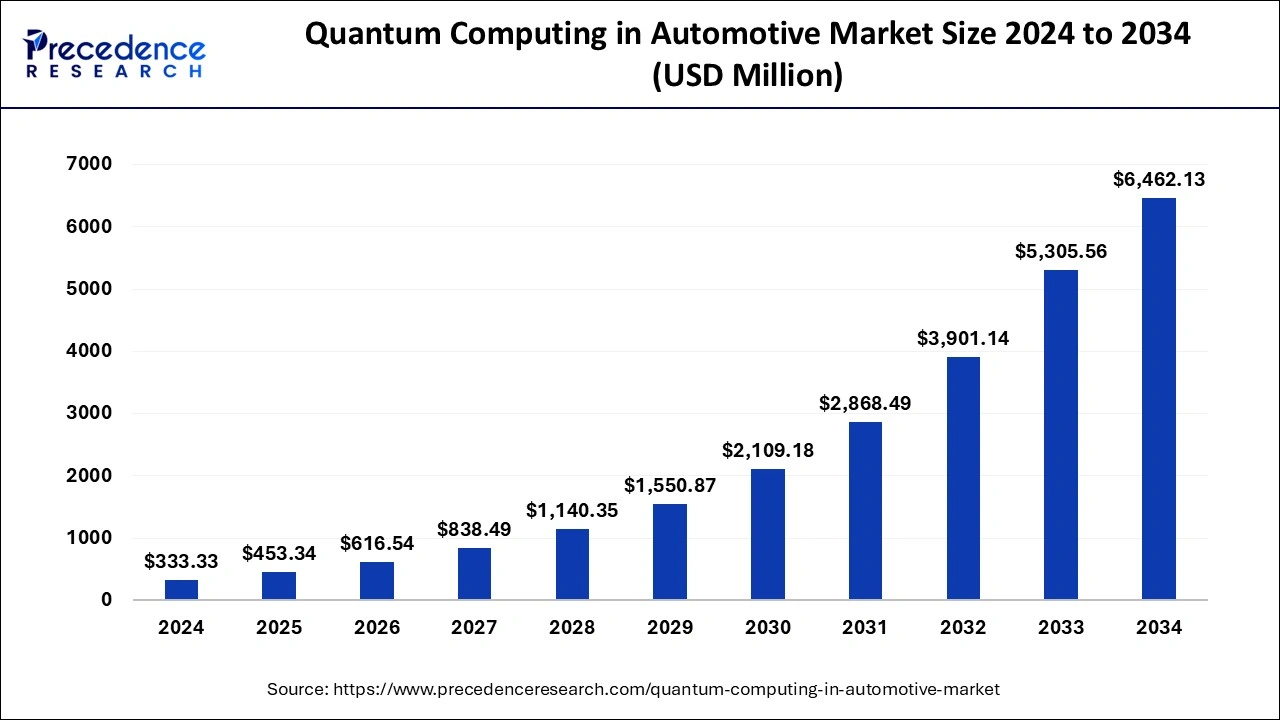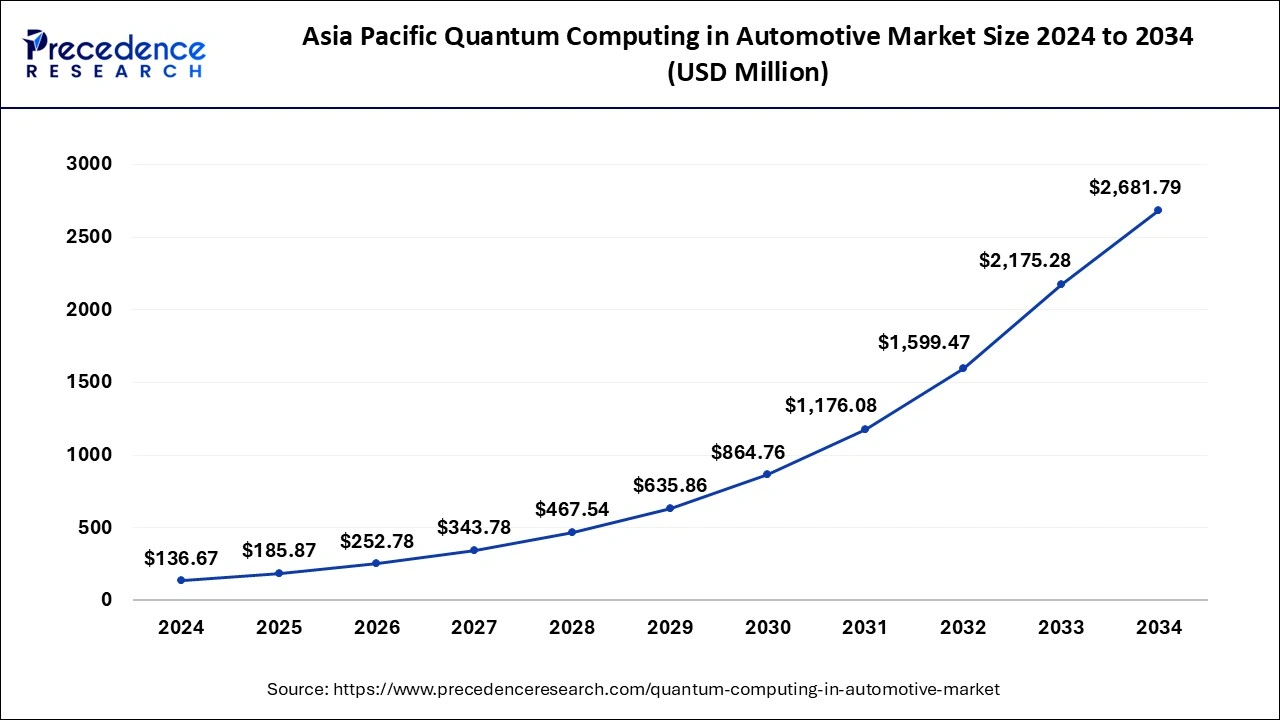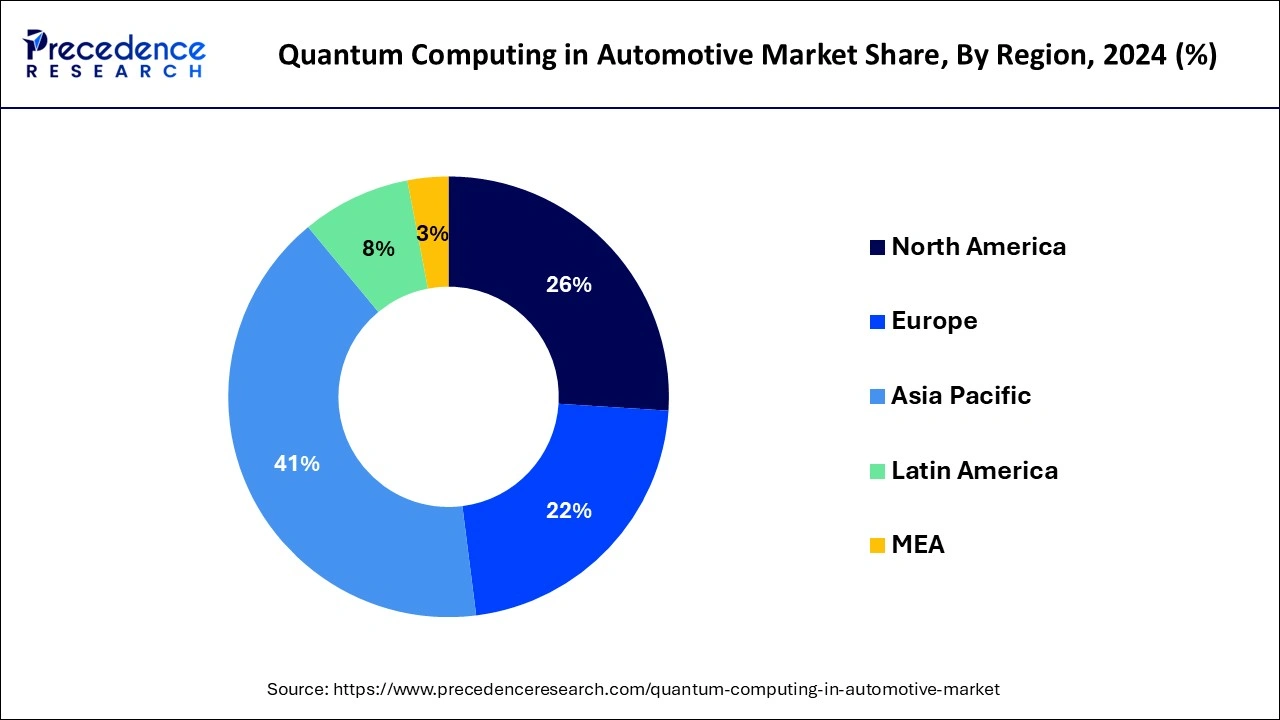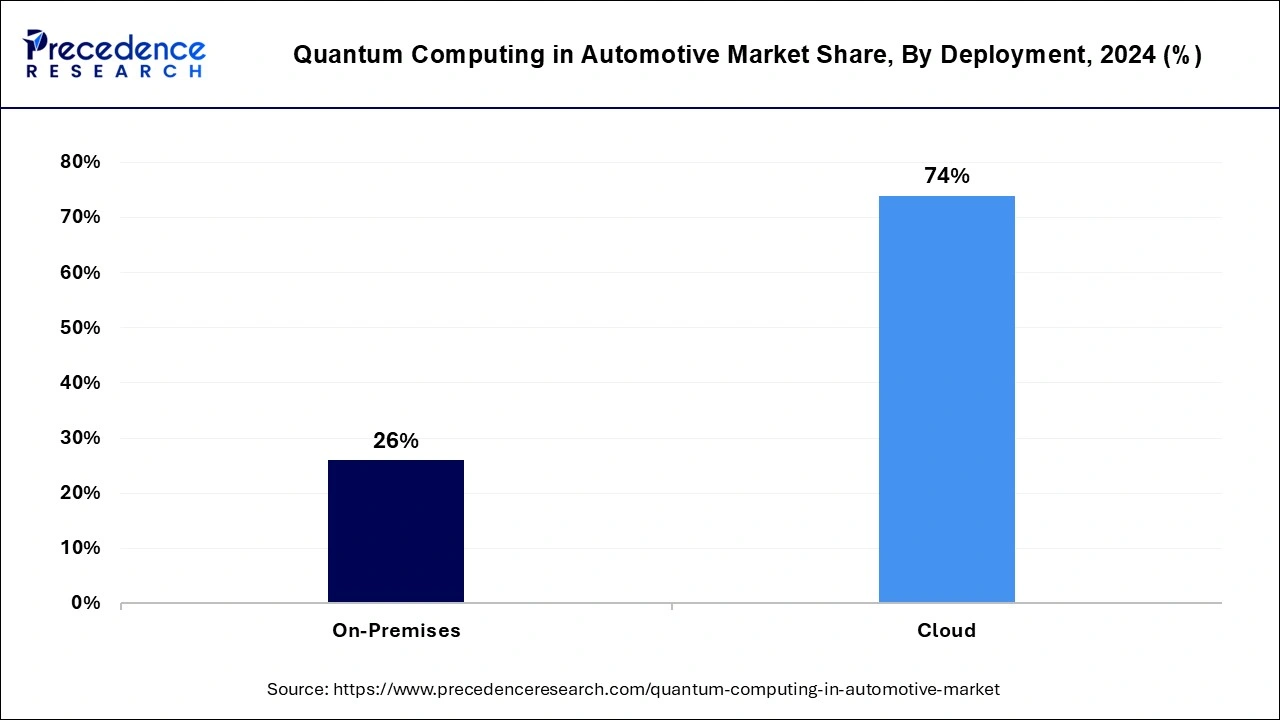January 2025
The global quantum computing in automotive market size is accounted at USD 453.34 million in 2025 and is forecasted to hit around USD 6,462.13 million by 2034, representing a CAGR of 34.51% from 2025 to 2034. The Asia Pacifc market size was estimated at USD 136.67 million in 2024 and is expanding at a CAGR of 34.67% during the forecast period. The market sizing and forecasts are revenue-based (USD Million/Billion), with 2024 as the base year.
The global quantum computing in automotive market size was calculated at USD 333.33 million in 2024 and is predicted to increase from USD 453.34 million in 2025 to approximately USD 6,462.13 million by 2034, expanding at a CAGR of 34.51% from 2025 to 2034. In the automotive industry, quantum computing holds promise across various areas such as vehicle design, manufacturing, supply chain optimization, and autonomous driving thus driving the market growth globally.

The Asia Pacific quantum computing in automotive market size was exhibited at USD 136.67 million in 2024 and is projected to be worth around USD 2,681.79 million by 2034, growing at a CAGR of 34.67% from 2025 to 2034.

Asia Pacific held the largest share of quantum computing in automotive market, particularly in the automotive sector. Countries in the Asia Pacific region, such as China, Japan, and South Korea, are increasing their investments in quantum research and development. Governments, universities, and private companies are collaborating to accelerate advancements in quantum computing technology, driving innovation and commercialization efforts.
Asia Pacific is home to a large pool of skilled scientists, engineers, and researchers with expertise in quantum mechanics and related fields. This talent pool fuels research and development initiatives and supports the adoption of quantum computing solutions across various industries, including automotive.
Asia Pacific is a hub for the automotive industry, with countries like China, Japan, South Korea, and India experiencing rapid growth in vehicle production and sales. As automotive companies in the region seek to enhance their competitiveness through innovation, there is increasing interest in leveraging quantum computing for vehicle design, manufacturing and autonomous driving technology.

North America is observed to be the fastest growing region in the quantum computing in automotive market during the forecast period, particularly in the automotive sector. North America has advanced technological infrastructure, including research facilities, universities, and technology hubs, that foster innovation and development in quantum computing. This robust ecosystem attracts top talent and encourages collaboration between academia, industry, and government agencies.
The region is home to leading quantum computing companies, such as IBM, Google, and Microsoft, as well as renowned research institutions like NASA and the National Laboratories. These organizations drive advancements in quantum technology and play a pivotal role in shaping the future of the industry.
North American governments have made significant investments in quantum research and development, recognizing its strategic importance for national security, economic development and technological leadership. Funding initiatives and partnerships with industry stakeholders fuel innovation and accelerate the commercialization of quantum solutions.
North America's dominance in the quantum computing market is driven by its technological expertise, collaborative ecosystem, supportive regulatory environment, and market demand, positioning the region as a key player in shaping the future of quantum-powered solutions for the automotive industry.
Europe is emerging as a notable growth region in the quantum computing in automotive market, with significant momentum driven by Investment in Research and Development in European countries, including Germany, the United Kingdom, and France, are making substantial investments in quantum research and development. Europe boasts a strong network of academic institutions, research centres, and industrial partners collaborating to drive innovation in quantum computing.
Moreover, with increasing concerns about cybersecurity threats, European governments and organizations are prioritizing the development of quantum-safe encryption and communication technologies. Thus, Europe is a leading hub for automotive innovation, with established manufacturers and startups driving advancements in vehicle technology.
The quantum computing in automotive market offers solutions that leverage the principles of quantum mechanics to perform computations at speeds and scales that are currently unattainable with classical computers. These quantum computers have the potential to solve highly complex problems that are beyond the capabilities of traditional computers.
In the automotive industry, quantum computing holds promise across various areas such as vehicle design, manufacturing, supply chain optimization, and autonomous driving. Quantum computing can enable automotive engineers to perform complex simulations and optimizations that are crucial for designing safer, more fuel-efficient, and environmentally friendly vehicles.
Several automotive companies, including traditional automakers and tech startups, are already exploring partnerships with quantum computing companies to conduct research and development in this field. These collaborations aim to unlock the full potential of quantum computing to drive innovation and competitiveness in the automotive market.
| Report Coverage | Details |
| Growth Rate from 2025 to 2034 | CAGR of 34.51% |
| Global Market Size in 2025 | USD 453.34 Million |
| Global Market Size in 2024 | USD 333.33 Million |
| Global Market Size by 2034 | USD 6,462.13 Million |
| Largest Market | Asia Pacific |
| Base Year | 2024 |
| Forecast Period | 2025 to 2034 |
| Segments Covered | Component, Application, Deployment, and Stakeholders |
| Regions Covered | North America, Europe, Asia-Pacific, Latin America, and Middle East & Africa |
Government investments
Governments are allocating more funds to support quantum research initiatives, including quantum computing. This funding enables advancements in quantum hardware and software, which can benefit automotive applications. Government investments accelerate the development of quantum technologies, making them more accessible and reliable for automotive companies. This allows for faster integration of quantum computing solutions into automotive design, manufacturing, and supply chain processes.
Governments are investing in infrastructure to support quantum research and development, such as quantum labs, testing facilities, and computing centres. This infrastructure enables researchers and companies to conduct experiments, simulations, and trials related to automotive use cases more efficiently.
Also, Governments are developing regulatory frameworks and standards for quantum technologies, providing clarity and guidance for automotive companies interested in adopting quantum computing solutions. This regulatory support encourages investment and reduces uncertainty, fostering a conducive environment for the quantum computing in automotive market’s growth. Governments recognize the strategic importance of quantum computing in maintaining global competitiveness in industries such as automotive manufacturing. By investing in quantum research and innovation, governments aim to position their countries as leaders in quantum technology adoption, driving economic growth and job creation.
scalability of quantum hardware
One major restraint for the quantum computing in automotive market is the current limitations in quantum computing technology. While quantum computing holds immense potential, the technology is still in its early stages of development, facing several challenges that hinder its widespread adoption in the automotive industry.
One significant limitation is the scalability of quantum hardware. Quantum computers are highly sensitive to environment. Additionally, error correction poses a significant hurdle in quantum computing. Quantum systems are susceptible to errors caused by noise and decoherence, which can degrade the accuracy of computations. Developing robust error correction techniques that effectively mitigate these errors is essential for ensuring the reliability and stability of quantum computing platforms in automotive use cases.
Emergence of highly sensitive sensors
One future opportunity for quantum computing in the automotive market lies in the development of quantum-enhanced sensors for autonomous vehicles. Quantum sensors leverage the principles of quantum mechanics to achieve unprecedented levels of precision and sensitivity, making them ideal for various automotive applications.
Quantum sensors can enhance the perception capabilities of autonomous vehicles by providing accurate and real-time data about the vehicle's surroundings. quantum-enhanced LiDAR (Light Detection and Ranging) sensors can offer higher resolution and longer detection ranges compared to traditional LiDAR systems, enabling safer navigation in complex environments.
Moreover, quantum sensors can detect subtle changes in environmental conditions, such as temperature, pressure, and magnetic fields, with unparalleled accuracy. This enables autonomous vehicles to adapt to dynamic road conditions more effectively, enhancing overall safety and reliability.
The software segment held the largest share of quantum computing in the automotive market globally in 2024. The growth is due to, the software segment of quantum computing is as it plays a pivotal role in unlocking the full potential of quantum technology. Software is essential for developing quantum algorithms tailored to automotive applications. These algorithms optimize vehicle design, manufacturing processes, supply chain management, and autonomous driving systems. With the right algorithms, quantum computing can revolutionize how cars are engineered, produced, and operated.
Quantum software is developed to solve optimization problems, such as route planning, vehicle routing, and inventory management. Therefore, the software segment of quantum computing holds immense potential to transform the automotive industry by enabling advanced simulations, optimization, machine learning, and cybersecurity solutions.
In the quantum computing in automotive market, the cloud segment is set to dominate. Cloud-based quantum computing platforms offer scalable access to quantum resources, allowing automotive companies to leverage computing power on-demand. This scalability ensures that automotive firms can accommodate varying computational needs, from small-scale simulations to large-scale optimization tasks, without investing in dedicated quantum hardware. Automotive companies can access quantum resources through pay-per-use or subscription-based models, reducing capital expenditures and operational costs associated with deploying and managing quantum computing systems on-premises.

Cloud-based quantum computing platforms facilitate collaboration and knowledge sharing among automotive companies, research institutions, and quantum computing providers. By providing a centralized platform for collaboration, data sharing, and algorithm development, cloud-based quantum computing accelerates innovation and fosters a collaborative ecosystem within the automotive industry.
The routing and traffic segment held the largest share of the quantum computing in automotive market due to the traffic congestion is a significant challenge. Specially in in urban areas, leading to increased travel times, fuel consumption, and environmental pollution. Quantum computing offers the potential to optimize traffic flow, reduce congestion, and improve overall transportation efficiency by solving complex routing and traffic management problems.
Quantum algorithms can process vast amounts of data in real-time, enabling dynamic routing and traffic management decisions based on current road conditions, weather patterns, and vehicle movements. This capability enhances the responsiveness and adaptability of traffic management systems, leading to smoother traffic flow and reduced delays.
Quantum computing can optimize transportation networks by finding the most efficient routes for vehicles, considering factors such as traffic volume, road capacity, and environmental impact. Quantum algorithms can identify routing strategies to minimize travel time, fuel consumption leading to more sustainable and environmentally friendly transportation systems.
Therefore, the dominance of the routing and traffic segment in the quantum computing in automotive market for the automotive sector is driven by the pressing need to address traffic congestion, improve transportation efficiency, and enhance urban mobility.
The automotive tier 1 and tier 2 supplier’s segment is positioned for rapid growth in the quantum computing in automotive market. Automotive tier 1 and tier 2 suppliers play a critical role in the automotive supply chain, providing components, systems, and technology solutions to vehicle manufacturers. Quantum computing offers opportunities for suppliers to integrate advanced optimization, simulation, and predictive analytics capabilities into their supply chain solutions. Quantum-powered supply chain solutions enable suppliers to optimize inventory management, production scheduling, and logistics operations, leading to cost savings, efficiency gains, and improved reliability for automotive OEMs.
Quantum computing can enhance the efficiency and quality of manufacturing processes for automotive tier 1 and tier 2 suppliers. Quantum algorithms can optimize production workflows and improve product quality by simulating and optimizing manufacturing processes at the atomic level. Quantum-powered manufacturing solutions enable suppliers to achieve higher levels of precision, consistency, and flexibility in producing automotive components and systems, meeting the stringent requirements of vehicle manufacturers.
By Component
By Application
By Deployment
By Stakeholders
By Geography
For questions or customization requests, please reach out to us at sales@precedenceresearch.com
No cookie-cutter, only authentic analysis – take the 1st step to become a Precedence Research client
January 2025
December 2024
August 2024
May 2024